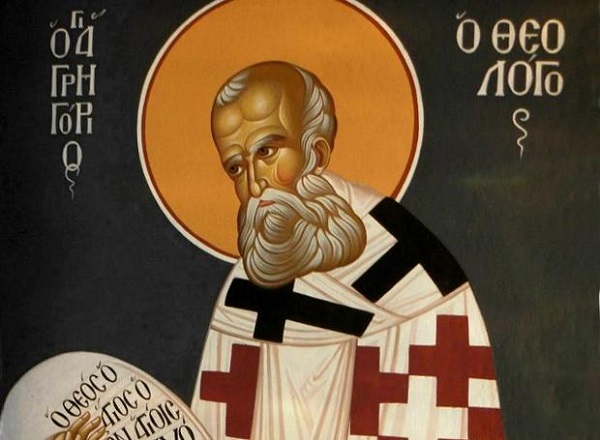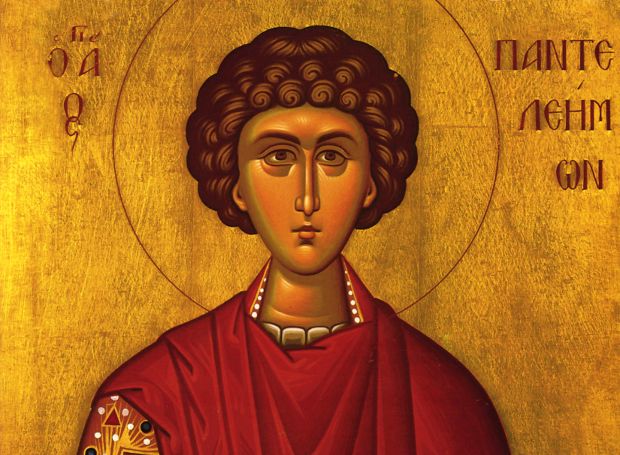Saint Gregory the Theologian’s 35th Oration, On Holy Easter


XXIV. If you are Simon Cyreneaus, take up the Cross and follow. If you are crucified with him as a robber, acknowledge God out of gratitude. If even he [Christ] was numbered among the transgressors for you and your sin, become an observer of the law for his sake. Bow before him who was hanged for you, even though you yourself are hanging; gain from the wickedness; purchase salvation by your death; enter with Jesus into paradise, so that you may see from what you fell. Gaze upon the beauty that is there; let the faultfinder die outside with his blasphemies. And if you are Joseph from Arimathea, beg the body from the crucifier; make your own that which cleanses the world. If you are Nicodemus, the worshipper of God by night, bury him with spices. If you are Mary, or another Mary, or Salome, or Joanna, weep in the early morning. Be first to see the stone taken away, and perhaps you will see the angels and Jesus himself.
Say something; hear his voice. If he says to you, ‘Do not touch me’, stand far off. Respect the Word, and do not be sad, for he knows those to whom he will appear first. Inaugurate the Resurrection. Assist Eve who was the first to fall, the first to embrace Christ and make him known to the disciples. Become Peter or John; hasten to the sepulcher, running together, running against one another, vying in good competition. And even if you are beaten in speed, win through zeal, not merely peering into the tomb, but entering it. And if, like Thomas, you were absent when the disciples gathered to whom Christ showed himself, when you do see him do not lack faith. Even if you do not have faith, believe those who tell you; and if you cannot believe them either, then trust the imprint of the nails. If he descends into hell, descend with him. Learn the mysteries of Christ there, too, what the purpose of the twofold descent is, what its aim is. Does he simply save everyone there by appearing; or, even there, only those who believe?
XXVIII. We now need to sum up our discourse as follows: We were created that we might benefit. We benefitted because we were created. We were entrusted with paradise, to enjoy it. We received a commandment so that we might thrive by keeping it. Not that God did not know what would take place, but he had already made the law of free will. We were deceived because we were envied. We were cast out because we transgressed. We fasted because we had not fasted, having been enthralled by the tree of knowledge. For the commandment was ancient, as old as we were, and was a kind of training for our souls and a curb on pleasures. We were reasonably made subject to it, in order that, by keeping it, we might enjoy that which we had lost by not keeping it. We needed an incarnate God, a God put to death, that we might live. We were put to death together with him, that we might be cleansed; we rose with him because we were put to death with him; we were glorified with him, because we rose with him.
XXIX. There are, indeed, many miracles from that time: God crucified; the sun darkened and again rekindled (for it was fitting that the creatures should suffer with their Creator); the veil rent; the blood and water shed from his side: the one because he was human, the other because he was above human; the earth quaking; the rocks split for sake of the Rock; the dead raised as a pledge of the final resurrection of all people; the signs at the sepulcher and after the sepulcher, which no-one can fittingly praise. Yet none of these is equal to the miracle of my salvation. A few drops of blood recreate the whole world, and become to all people what rennet is to milk, drawing us together and linking us as one.
XXX. But, Pascha, great and holy and purifier of all the world- for I will speak to you as to a living person. Word of God and light and life and wisdom and might- for I rejoice in all your names — offspring and outpouring and seal of the great intellect. Word who can be perceived and Man who can be seen, you who bear all things, binding them by the word of your power, receive this discourse, not as first fruits, but perhaps as the completion of my offerings, a thanksgiving, and at the same time a supplication, that we may suffer no evil beyond those necessary and sacred cares in which our life has been passed. And check the tyranny of the body over us (You see, Lord, how great it is and how it bows me down) or stay your own sentence, if we are to be condemned by you. But if we are to be released, in accordance with our desire, and be received into the heavenly tabernacle, there too it may be we shall offer acceptable sacrifices upon your altar, to the Father and Word and Holy Spirit. For to you belong all glory and honor and might, unto the ages of ages. Amen.





